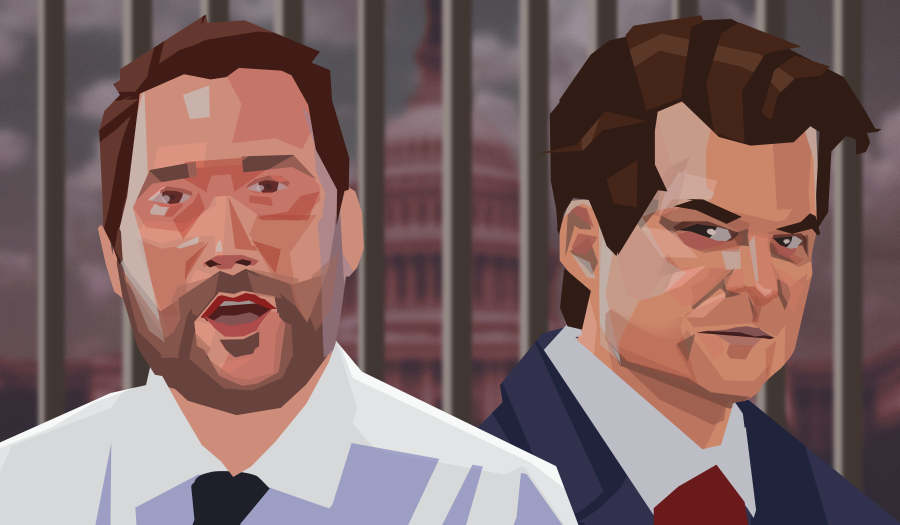We must reconcile the multiple personas of public figures to make proper evaluations.
Often political positions are enough for us to reject a party, platform or politician. Yet this is not where our search for accountability should end. Instead, the American citizenry should look at these influential figures’ positions as extensions of their past lives and beliefs. For example, Rep. Matt Gaetz’s misogynistic positions on women’s reproductive health must be combined with new revelations on sex-trafficking as we evaluate his position as a legislator. In fact, these past lives must be inspected through each of our perspectives as if these influential figures were a part of our lives. Only when we stop drawing false distinctions between political personas and private personas, can we elect bodies of figures capable of executing civic duties that affect all aspects of their constituents’ lives.
We are often so caught up in the partisan rhetoric that we forget the moral standards that all of us hold each other to. If a politician’s tenure is riddled with allegations and charges of sex-trafficking, how can we expect him to talk on human rights, let alone women’s rights? This is the case with Gaetz, who is currently hoping to launch a presidential bid for 2024.
We have become so desensitized to the harm that people like Gaetz have allegedly caused. In turn, we automatically separate Gaetz’s problematic public persona from his private behavior. Our reactions towards these two aspects are akin to those towards an actor and a show they are on. We act like Gaetz’s predatory past is a non-issue as it concerns his politics. By ignoring these allegations and the subsequent federal investigation, voters also inadvertently reduce the severity of such accusations and are complacent when conspiracy theories blossom. The same group of conspiracy theorists, QAnon, who easily manufactured an entire theory against Democrats by claiming that liberals are lording over illegal sex-rings exploiting minors, is now ardently defending Gaetz.
Gaetz is just one beneficiary of a system which depends on hiding crucial, potentially illicit elements of influential figures’ lives as they pose as beacons of justice. One does not have to look far to stumble upon a variety of cases ranging from racism to corruption plaguing politicians’ past. Yet, some of these people become president, while others become congressmen, and others still have the audacity to enter a life of public service when they have gone out of their ways to create an unsafe atmosphere for those in their private lives. While sex trafficking, a heinous crime by general public consensus, has more roundabout implications as it concerns legislation, other accusations have much more direct effects.
One of the most notable examples is how former President Donald Trump treated potential Black tenants when he worked in real estate. During his presidency, it became very clear that Trump was against Black Lives Matter and supported flagrantly racist voting restrictions. But this man was the same person who was embattled in a case 45 years earlier for redlining his very own apartments based on race. When a Black American went in, he was told that the Trump complex was out of residences. When Sheila Morse, a white American went in, she was welcomed with open arms. Somehow, we were surprised as Pres. Trump rescinded policies that allowed the incorporation of low income and high income housing into mixed neighborhoods. Somehow, the private and public policies get divided where people refuse to see correlations that open one’s eyes into a person’s character. His supporters still insist that Trump is not racist.
These glimpses into the morals which extend into these people’s politics come in different forms. We saw some come as predatory allegations like those against Wyoming’s U.S. House At-Large candidate Anthony Bouchard for impregnating a 14-year old when he was already an adult. We saw others come as corruption charges like those against California’s own Duncan Hunter, an adamant supporter of tax-breaks for the ultra wealthy. These people have often subsequently admitted to committing these acts that are amoral and often illegal and still are able to and do run for public office, and maintain federal pension benefits.
Of course, we get the occasional breakthrough on these malicious people, like when Trump’s former lawyer Michael Cohen agreed to offer incriminating evidence, or when Gaetz’ assistant Joel Greenberg plead guilty to related charges. Somehow though, even these breaks are futile in reconciling the private evils of individuals with their very public stances.
If we think about it, Nixon’s Watergate scandal may have lived in infamy, but we didn’t let the scandal inform our opinion on his political policies. Why? We simply did not see these two as being interconnected.
Yes, as it is, policy stances of public servants are very difficult to keep track of. But if any politician is in their field to get something out of it beyond aiding the public and maybe having their otherwise silenced voice heard, we must work to add this into our evaluation of them. With this ability to create a well-rounded perception of the beliefs and actions of our politicians, voters can work towards ushering in officials whose works outside of the government are positive reflections of the values on racism, classism and other forms of bigotry. This is crucial to creating a country where our representatives are serving us after proving themselves in their service to their own communities.
Art by Nicholas Regli for UC San Diego Guardian.
















